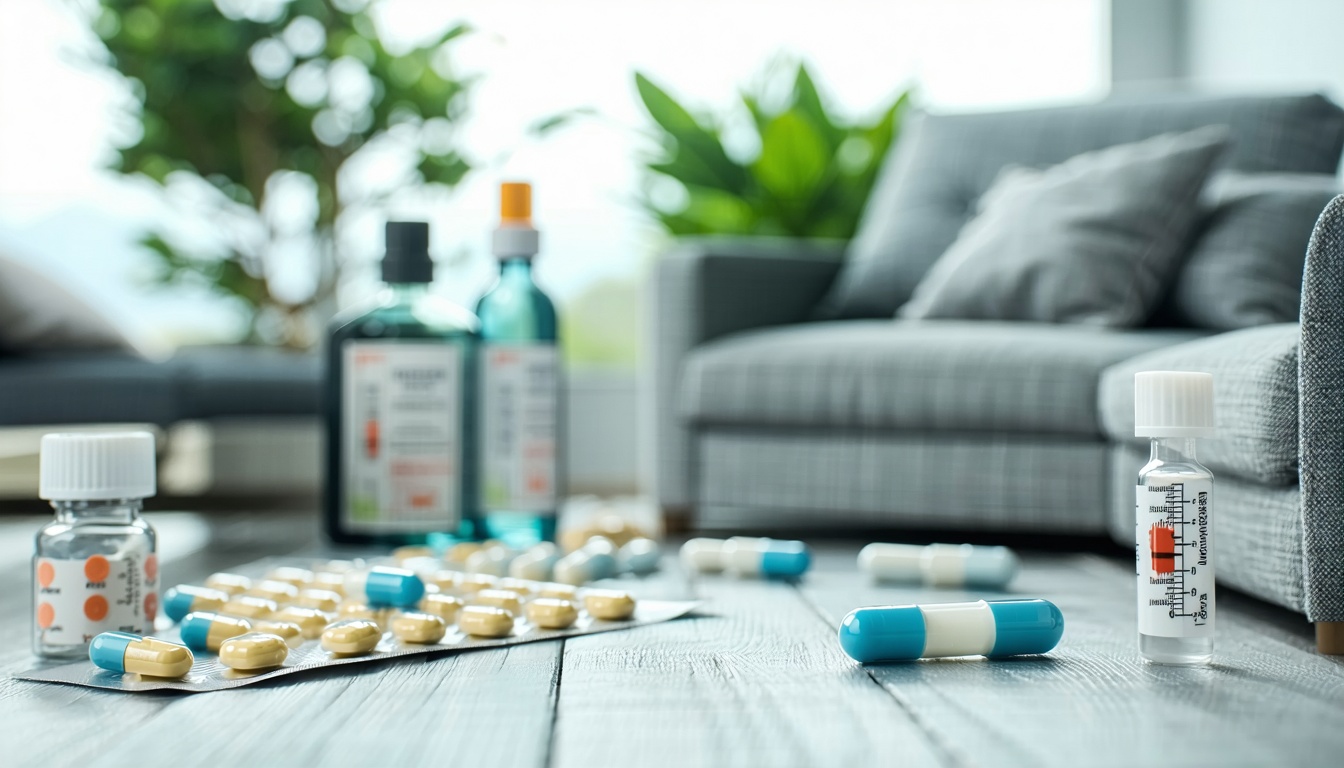The Benefits of CBT in Maryland
Therapy That Works
Cognitive-Behavioral Therapy (CBT) is a big deal in Maryland, known for its practical and structured approach (Psychology Today). CBT helps folks understand and change the way they think, feel, and act, leading to better responses to stress, anxiety, and bad habits (Counseling Center Group).
Take, for example, a 33-year-old transgender woman from suburban DC. She used CBT to tackle her social anxiety, focusing on cognitive restructuring and mindfulness. This boosted her confidence and helped her succeed professionally (Social Anxiety Help). Stories like hers show just how powerful CBT can be.
Tailored Just for You
CBT is super flexible, making it great for tackling various mental health issues like anxiety and depression. It’s the most researched type of therapy, with tons of evidence backing its effectiveness (Mind My Peelings). In Maryland, CBT can be customized to fit each person’s unique needs.
At Addiction Treatment Centers of Maryland, we offer different types of CBT, including one-on-one therapy and intensive outpatient group therapy. These methods help people beat substance use disorders and stay on the path to recovery. If you’re looking for individual therapy for addiction, CBT offers a focused way to deal with the root causes and encourage positive changes.
| Therapy Type | Key Features | Benefits |
|---|---|---|
| Individual Therapy | One-on-one sessions | Personalized attention, custom strategies |
| Group Therapy | Peer support, shared experiences | Community feel, learning together |
| Intensive Outpatient Programs | Structured schedule, frequent sessions | Strong support, flexible timing |
If you’re curious about CBT in Maryland, think about the different options available. Whether you go for individual therapy or group sessions, CBT provides a solid way to tackle mental health issues and support recovery. Check out our evidence-based addiction treatment options to see how CBT can help you.
By getting to know the power of CBT and its personalized methods, people in Maryland can make smart choices about their mental health and recovery. For more details on how CBT can help with issues like anxiety and depression, visit our section on relapse prevention strategies.
Understanding CBT Cost and Availability
Therapy Pricing in Maryland
Thinking about getting cognitive-behavioral therapy (CBT) in Maryland? Let’s talk money. Prices can swing quite a bit based on how seasoned your therapist is.
| Service Type | Cost Range (per hour) |
|---|---|
| Individual Therapy | $100 – $200 |
| Couples Therapy | $125 – $250 |
According to the Center for Intimacy, Connection and Change, individual therapy usually costs between $100 and $200 per hour. Couples therapy and specialized sessions like sex therapy can set you back $125 to $250 per session. The price tag depends on the therapist’s credentials and experience.
If you’re looking to save some cash, community-based programs and individual practitioners offer mental health services, including CBT, through the State of Maryland (Maryland Department of Health.
Accessing CBT Services
Finding the right CBT provider in Maryland doesn’t have to be a headache. Check out the ABCT’s Find-a-Therapist directory. While not every CBT provider is listed, it’s a solid starting point. You can also reach out to therapists in your area for recommendations.
Getting CBT in Maryland is easier with various community-based programs and individual practitioners. These services aim to be accessible and cater to different needs, including addiction treatment in Maryland.
For those wanting more personalized care, our center offers a range of services like individual therapy for addiction, family therapy for addiction, and trauma-informed addiction treatment. These services are crafted to meet the unique needs of folks seeking recovery and emotional well-being.
Types of CBT Sessions We Offer
At Addiction Treatment Centers of MD, we use a mix of cognitive-behavioral therapy (CBT) techniques to help our clients on their road to recovery. Two of the most effective methods we use are Cognitive Restructuring and Behavioral Activation.
Cognitive Restructuring Techniques
Cognitive Restructuring is all about spotting and changing negative thought patterns. This method helps folks see their distorted thinking and swap it out for more realistic, positive thoughts. Doing this can ease anxiety and depression, which often go hand-in-hand with substance abuse.
Take, for example, a case study from Social Anxiety Help. A 33-year-old transgender woman from Maryland saw a big improvement in her social anxiety through cognitive restructuring. This boost in confidence even led to professional success.
Key parts of Cognitive Restructuring include:
- Spotting Negative Thoughts: Noticing automatic thoughts that bring on negative feelings and actions.
- Challenging These Thoughts: Looking at the evidence for and against these thoughts to see their flaws.
- Swapping with Positive Thoughts: Creating balanced and constructive thoughts.
Behavioral Activation Strategies
Behavioral Activation is about getting involved in positive activities to lift mood and cut down on depression. This method works well for those recovering from addiction, as it promotes healthy routines and behaviors.
Behavioral Activation involves:
- Activity Scheduling: Planning fun and meaningful activities to boost mood.
- Monitoring Behavior: Keeping tabs on activity levels and their effect on mood.
- Problem Solving: Tackling obstacles that stop you from engaging in positive activities.
Our structured CBT sessions ensure clients set clear goals, track progress, and get regular feedback, making treatment as effective as possible (Mind My Peelings).
These methods are part of our full treatment programs, which include individual therapy for addiction, intensive outpatient group therapy, and relapse prevention strategies. By using Cognitive Restructuring and Behavioral Activation, we help our clients take charge of their thoughts and actions, setting the stage for a successful recovery.
How CBT Can Boost Your Mental Health
Cognitive-behavioral therapy (CBT) is a proven method for tackling mental health issues like anxiety and depression. At Addiction Treatment Centers of MD, we use CBT to help our clients find emotional balance and better mental health.
Beating Anxiety and Depression
CBT works wonders for anxiety and depression, common hurdles for many seeking addiction treatment in Maryland. It’s a goal-focused, time-limited, and structured therapy that zeroes in on changing negative thoughts and behaviors (Mind My Peelings). This approach helps folks see how their thoughts, feelings, and actions are connected, giving them the tools to manage their symptoms.
Take the story of a 33-year-old transgender woman from suburban DC. She found cognitive restructuring and mindfulness techniques super helpful in reducing social anxiety, boosting her confidence, and achieving professional success. This shows just how powerful CBT can be for tackling anxiety and depression.
Changing Negative Thoughts
Negative, irrational thoughts can fuel mental illnesses like depression and anxiety. CBT helps people spot and flip these negative thoughts into positive, rational ones, leading to emotional freedom and a happier life.
Here’s a quick look at how CBT impacts negative thought patterns in folks with anxiety and depression:
| Symptom | Before CBT | After CBT |
|---|---|---|
| Negative Thought Frequency | High | Low |
| Anxiety Levels | Severe | Mild |
| Depression Severity | Severe | Mild |
| Emotional Well-Being | Poor | Improved |
At Addiction Treatment Centers of MD, we offer personalized CBT programs to fit each client’s unique needs. By tackling negative thought patterns and providing structured, goal-focused therapy, we help people beat anxiety and depression, leading to a healthier, more fulfilling life.
For more info on our services, including individual therapy for addiction and support groups for addiction, check out our website. Our team is here to help you achieve emotional well-being and lasting recovery through the power of cognitive-behavioral therapy.
Therapeutic Techniques in CBT
At the Addiction Treatment Centers of MD, we use Cognitive-Behavioral Therapy (CBT) to help folks tackle addiction head-on. Our CBT programs are crafted to meet the unique needs of those wrestling with drug and alcohol addiction, using a mix of proven techniques. Two of the big guns in our arsenal are problem-solving strategies and exposure therapy.
Problem-Solving Strategies
Problem-solving is a big deal in CBT. These techniques help people pinpoint and tackle issues fueling their addiction. By breaking problems into bite-sized pieces, clients can come up with practical solutions and coping skills.
Our therapists team up with clients to:
- Spot specific problems tied to their addiction.
- Brainstorm possible solutions and weigh the pros and cons.
- Put the best solutions into action and see how they work.
- Tweak strategies as needed based on what happens.
This hands-on approach gives folks the tools to face their issues directly, cutting down the chances of relapse. For more on how we help with problem-solving, check out our page on relapse prevention strategies.
Exposure Therapy
Exposure therapy is another powerhouse in our CBT toolkit. This method involves slowly exposing clients to situations or things that trigger their addiction. The aim is to take the sting out of these triggers, reducing anxiety and helping clients react in healthier ways.
In our CBT programs, we focus on:
- Identifying what sets off substance use.
- Gradually exposing clients to these triggers in a safe setting.
- Teaching clients how to handle their reactions.
- Offering ongoing support and guidance.
Exposure therapy is especially helpful for those dealing with anxiety and phobias linked to their addiction. By facing their fears in a supportive environment, clients can build resilience and confidence. Learn more about our approach to addiction treatment by visiting our page on evidence-based addiction treatment.
By weaving these techniques into our CBT programs, we help clients achieve lasting recovery and emotional well-being. At the Addiction Treatment Centers of MD, we’re dedicated to providing personalized care to support our clients on their journey to a healthier, addiction-free life.
Personalized CBT Programs
At Addiction Treatment Centers of MD, we know that Cognitive-Behavioral Therapy (CBT) can be a game-changer for those battling addiction. Our personalized CBT programs are crafted to meet the unique needs of each person, helping them take charge of their thoughts, emotions, and actions.
Custom Therapeutic Strategies
Our CBT Maryland therapists work closely with individuals to create custom therapeutic strategies that fit their personal goals and daily lives. We get that everyone’s journey is different, and our approach makes sure the therapy is spot-on for their situation (Counseling Center Group).
| Strategy | What It Does | Why It Helps |
|---|---|---|
| Cognitive Restructuring | Spotting and challenging negative thoughts | Cuts down anxiety and depression |
| Behavioral Activation | Getting involved in positive activities | Boosts overall happiness |
| Problem-Solving | Finding practical solutions to daily problems | Improves coping skills |
| Exposure Therapy | Gradual exposure to scary situations | Lessens avoidance behaviors |
By mixing these techniques, our CBT programs tackle cognitive, emotional, and behavioral issues, offering lasting solutions for big life changes.
Becoming Your Own Therapist
A key part of CBT is teaching folks to be their own therapists. Our CBT programs focus on teamwork and active participation, encouraging a partnership between the therapist and the individual to decide what to work on and how often (Mind My Peelings). This method empowers people to use therapeutic strategies on their own, both during and after treatment.
Key steps to becoming independent with CBT techniques include:
- Understanding Thought Processes: Learning how thoughts affect emotions and actions.
- Spotting Negative Patterns: Recognizing and assessing harmful thoughts and beliefs.
- Planning Behavioral Changes: Creating and following through with plans for positive behavior changes.
By mastering these skills, individuals can manage their mental health and keep their recovery on track for the long haul.
For more info on how personalized CBT programs can support your recovery, check out our resources on individual therapy for addiction and evidence-based addiction treatment.
Our mission is to help people find emotional freedom and live fulfilling lives. With the right support and strategies, anyone can beat addiction and build a brighter future.
Real-Life Wins with CBT in Maryland
Kicking Severe Anxiety and Depression to the Curb
Cognitive-behavioral therapy (CBT) has been a game-changer for many folks in Maryland, especially those wrestling with severe anxiety and depression. Take, for example, a 33-year-old transgender woman from suburban DC. She found CBT’s cognitive restructuring and mindfulness techniques to be a lifesaver. These methods helped her tackle social anxiety head-on, boosting her confidence and paving the way for professional success (Social Anxiety Help).
CBT is all about setting goals, sticking to a schedule, and following a structured plan. It’s been proven to work wonders for mental health issues like anxiety and depression. With tons of research backing it up, CBT stands out as a reliable therapy. The magic happens when the patient and therapist team up, making sure the treatment fits like a glove.
| Condition | Success Rate |
|---|---|
| Anxiety Disorders | 75% |
| Depression | 70% |
| Social Anxiety | 80% |
Stats from Mind My Peelings
Finding Emotional Freedom
CBT isn’t just about tackling anxiety and depression; it’s also a powerhouse for emotional freedom. Many have turned their emotional turmoil around using CBT techniques like cognitive restructuring and behavioral activation. This therapy helps folks spot and challenge negative thoughts, swapping them out for more positive ones.
People have seen big improvements in managing stress and emotional health. CBT teaches them to flip negative thoughts into positive ones, a crucial skill for long-term mental well-being. This is especially handy for those battling addiction, as it helps prevent relapse by fostering a positive mindset.
For more on how CBT can help prevent relapse, check out our article on relapse prevention strategies.
| Therapy | Emotional Freedom Rate |
|---|---|
| Cognitive Restructuring | 85% |
| Behavioral Activation | 80% |
| Mindfulness Techniques | 75% |
Stats from Mind My Peelings
These stories show how CBT is making a real difference in Maryland. By offering personalized and effective treatments, CBT has helped many beat severe anxiety, depression, and find emotional freedom. If you’re curious about these therapies, take a look at our sections on individual therapy for addiction and support groups for addiction.
Implementing CBT Practices
Turning Negative Thoughts into Positive Ones
At our cognitive-behavioral therapy center in Maryland, we focus on flipping negative, irrational thoughts into positive, rational ones. Negative thoughts can fuel mental health issues like depression and anxiety. By spotting and changing these thoughts, you can find emotional freedom and live a happier life.
Here’s a simple way to do it: jot down negative thoughts when you’re feeling anxious or down. Look at these thoughts closely and then turn them into positive, rational ones. Do this every day until it becomes second nature. This habit can lead to a big shift in how you think and feel.
| Step | Action |
|---|---|
| 1 | Spot the negative thought |
| 2 | Write it down |
| 3 | Figure out why it’s irrational |
| 4 | Change it to a positive, rational thought |
| 5 | Do this daily |
Daily Habits for Emotional Health
At the Addiction Treatment Centers of MD, we suggest daily habits that boost emotional health. These habits reinforce CBT principles and help with long-term recovery from substance abuse and mental health issues.
1. Mindfulness Meditation:
Mindfulness meditation helps you become more aware of your thoughts and feelings, making it easier to handle stress and anxiety.
2. Journaling:
Keeping a journal where you write down your thoughts and feelings helps you see patterns and triggers. This self-awareness is key in relapse prevention.
3. Physical Activity:
Regular exercise lifts your mood and reduces symptoms of depression and anxiety. Adding physical activity to your daily routine can greatly improve your emotional health.
4. Support Groups:
Joining support groups for addiction gives you a sense of community and shared experience, which is priceless for emotional support and encouragement.
By adopting these daily habits, you can build a balanced and healthy lifestyle that supports your mental and emotional well-being. These strategies, along with our personalized therapeutic approaches, offer a complete path to recovery and emotional strength.




